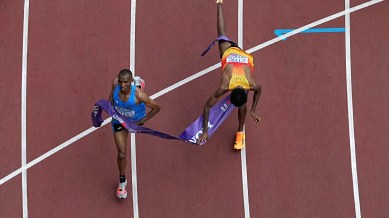Men’s marathon ends in photo-finish as Tanzanian Alphonce Felix Simbu pips Eritrean-born German Amanal Petros at the tape
Men's winner Simbu is Tanzania's first gold medallist at Worlds; German runner-up Petros is a former refugee from Eritrea.

A day after Kenya’s Peres Jepchirchir outrun Ethiopia’s Tigist Assefa in a sprint finish to the women’s marathon and won gold, an even more thrilling climax was witnessed in the corresponding men’s race in Tokyo.
Just three-hundredths of a second separated the winner and the runner-up, less than the gap in the men’s and women’s 100m finals. Germany’s Amanal Petros was in the lead with Tanzania’s Alphonce Felix Simbu trailing him by a few metres as they got off the road and re-entered the Japan National Stadium for the final 350 metres.
monthly limit of free stories.
with an Express account.
Gritting his teeth, Petros found a finishing kick as they turned past the bend for the final 100 metres. But just as it looked like the Eritrea-born German would be crowned the men’s marathon gold medallist, Simbu found an extra gear from somewhere. Petros looked over his shoulder a couple of times with 50 metres to go, but by then it was clear that the Tanzanian had the stronger legs. Petros even dipped at the finish line but Simbu powered through, looking straight ahead.
The photo-finish cameras, most often used for sprints, were needed to decide the winner – both runners clocked 2 hours, nine minutes and 48 seconds. Italian Iliass Aouani won the bronze with 2:09.53.
This was a history-making run for Simbu, the first gold medallist from Tanzania at the World Athletics Championships. He was only one of two athletes from the African nation sent to the Japanese capital.
Simbu and Petros rewrote the record books for the closest finish in a marathon. A redemption storyline had unfolded for both Simbu, as well as Petros, a former refugee from Eritrea who fled conflict to make Germany his home.
The 33-year-old Simbu had won a bronze medal at the 2017 Worlds (he also won the Mumbai Marathon that year) but since then had failed to finish on the podium at major championships.
“I made history today… the first Tanzanian gold medal at a world championships. In 2017, at the world championships in London, I won bronze. Then I ran many times but never got any medals, so finally it is here. When I arrived here, I told myself I was not going to give up. I just stayed with the group, it helped me and it ended really well. Just look at the finish and the kick. When we entered the stadium, I was not sure if I would win. I did not know if I won. But when I saw the video screens and me on the top of the results, I felt relieved,” Simbu said.
He credited his win to smart planning, including hill running, after struggling in the marathon at the Paris Olympics last year, where he finished 17th.
“Before this event, I was training in Tanzania and the conditions there helped me win this race. I remember, when I was in Paris last year, it was very challenging for me; the hills, all ups and downs. So before Tokyo, I decided to train on different surfaces. Sometimes I went to the hills, and that is what made the difference here,” Simbu said.
Remembering mum
Petros made extreme sacrifices to make a career in marathon and dedicated his silver medal to his mother. He grew up in Eritrea, in north-east Africa, and at the age of two, his family moved to Ethiopia to escape the war between the two countries. As a teenager, he embarked on a journey to Germany as a refugee without his mother and two sisters. In the European country, he sought asylum before becoming a citizen in 2015. He lost touch with his family in 2020 when the fighting got worse back in Africa.
“I grew up in Eritrea and haven’t seen my mum, now, for more than eight years, which is not easy. She will be very proud of me. It is night there now but when she wakes (up) she will be very, very proud. I can say, ‘Thank you so much mum. This is for you’,” Petros said after the race.
He also likened the finish to that in a sprint event, while praising Simbu for making history.
“I have never seen something like this in a marathon… It’s like the 100m. Coming into the finish, I was thinking about winning so a bit of me is feeling very sad. But I have to accept it. As an athlete, you have to learn for tomorrow, train hard, keep going and be thankful for the silver. I’m sad I lost gold in the last three metres but I am very happy also for the Tanzanian. That’s sport, that’s freedom, that’s why we compete. Sport is like life. You win today, you lose tomorrow,” Petros added.
These words, coming from an athlete who fled war to find home in a new country and then winning a major medal at track and field’s biggest stage, gave new meaning to what success means.